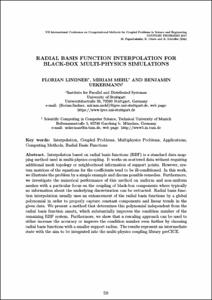Radial basis function interpolation for black-box multi-physics simulations

Estadístiques de LA Referencia / Recolecta
Inclou dades d'ús des de 2022
Cita com:
hdl:2117/190255
Tipus de documentText en actes de congrés
Data publicació2017
EditorCIMNE
Condicions d'accésAccés obert
Tots els drets reservats. Aquesta obra està protegida pels drets de propietat intel·lectual i
industrial corresponents. Sense perjudici de les exempcions legals existents, queda prohibida la seva
reproducció, distribució, comunicació pública o transformació sense l'autorització del titular dels drets
Abstract
Interpolation based on radial basis functions (RBF) is a standard data map-
ping method used in multi-physics coupling. It works on scattered data without requiring
additional mesh topology or neighborhood information of support points. However, sys- tem matrices
of the equations for the coefficients tend to be ill-conditioned. In this work, we illustrate the
problem by a simple example and discuss possible remedies. Furthermore, we investigate the
numerical performance of this method on uniform and non-uniform meshes with a particular
focus on the coupling of black-box components where typically no information about the underlying
discretization can be extracted. Radial basis func- tion interpolation usually uses an
enhancement of the radial basis functions by a global polynomial in order to properly
capture constant components and linear trends in the given data. We present a method that
determines this polynomial independent from the radial basis function ansatz, which
substantially improves the condition number of the remaining RBF system. Furthermore, we
show that a rescaling approach can be used to either increase the accuracy or improve the
condition number even further by choosing radial basis functions with a smaller support
radius. The results represent an intermediate state with the aim to be integrated into the
multi-physics coupling library preCICE.
ISBN978-84-946909-2-1
| Fitxers | Descripció | Mida | Format | Visualitza |
|---|---|---|---|---|
| Coupled-2017-03 ... function interpolation.pdf | 295,5Kb | Visualitza/Obre |

